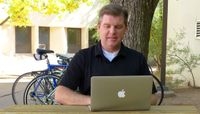A business professor learns to teach the world
Students all over the world are coming to grips with the gap between the theory of what international free trade should be and the reality of what it is through a new Massive Online Open Course (MOOC) offered by Professor of Strategic Management at Anderson School of Management Douglas Thomas.
Thomas’ class in the Global Business Environment has attracted more than 8,000 students from 157 countries. His MOOC on the Global Business Environment is the third that the University of New Mexico is offering through Coursera, and the first course offered in both English and Spanish.
Thomas teaches online courses for UNM, but having that many students, with their varied personal experience changes the dynamics. One element of this MOOC explains of the theory of free trade and protectionism. He says, “Students post articles on experiences they have had. They talk about their own point of view and how some countries benefit more from free trade than others. In some countries the rules of the game are set up in such a way that certain parts of society benefit and others do not.”
The students set up forums, and the discussions are often lively because there is sometimes a great contrast between the theory of how a business environment should work and the reality for the students.
Thomas likes the diversity of students in the course. About 14 percent of his students are from the United States, 8 percent from Mexico, 7 percent from India and 6 percent from Brazil and Spain. He has students from St. Lucia, a tiny island in the Caribbean. “They are interested in participating and understanding how the world works,” he says. “They might not have access to education in any other way, so I think this is a great thing.”
If you take the Coursera course, you have access to seven video clips a week. Each clip is lasts between 5 and 10 minutes. So students get about an hour’s worth of lecture, broken down into specific topics. The second part of the course Global Business Environment II opens on Nov. 3 and he says that will focus on practical business topics.
“I’ve just filmed the session on international entrepreneurship. We focus on how to start and operate an international business, and on the idea that there are born global firms,“ he says. “It used to be the case that when you started a company it might take years before you began exporting. Usually only large firms had the resources and the contacts to do that, but now we see these born global firms.”
This is an area that he is particularly passionate about. “It is really important that students be aware that they have the ability to start a business across borders, wherever they are living. And so we show them a lot of data about rates of entrepreneurship across borders and some of the challenges that exist.”
In the course he points students to micro financing resources. He shows them learning resources so they can start a one or two person company by learning programming languages online for free, then building an app that can go into a global apps store.
“For example I show them Alibaba, which just went public. Any of us can import very inexpensive produces manufactured in China from jewelry to cosmetics to machinery using Alibaba. You don’t have to go to China to make the contact. You can do it here in the U.S. They are buying stuff on Alibaba and listing them on Ebay or selling cases in the local cellphone store,” he says.
One of the biggest challenges for Thomas was getting used to speaking to the camera and visualizing the students listening to his talks. But he is becoming more familiar with the process. Now he thinks about the doors his course may open.
“That’s the promise of Coursera. This is free education that maybe people don’t have access to for traditional higher education because of money, responsibility, caste systems or whatever. But they can expose themselves to ideas through courses like this and spark something that will set them on a journey that will hopefully change their life.”
By Karen Wentworth — October 27, 2014





